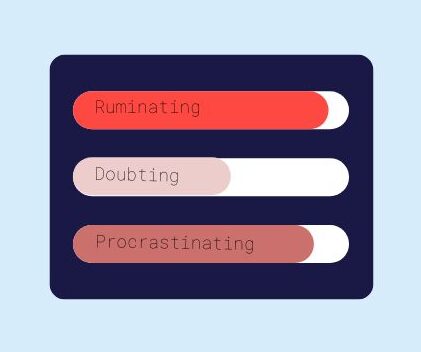
Procrastination refers to intentionally, volitionally delaying or putting off tasks, activities, projects despite their importance and negative consequences in your day-to-day life.
These tasks could be related to work, school performance, daily living (laundry, cleaning), or other personal tasks such as calling the bank or scheduling an appointment.
Although procrastination may offer people a temporary break from an upcoming deadline, the consequences of procrastination are almost uniformly negative.
These consequences include missing deadlines, not completing necessary tasks, scrambling at the last minute to complete something with high levels of stress, and lower quality of work produced due to that stress
Often people who procrastinate make inaccurate predictions (under-estimation) of the amount of time needed to complete activities and prioritize fun or interesting tasks over more aversive or boring tasks.
Another driver of procrastination is the desire to complete a task to the best of the person’s ability, leading the person to wait until they are “ready” to complete it or avoid doing the task due to thoughts about not being good enough at the task.
For example, Charlie finds school work annoying and boring, he just does not see the point. When thinking about doing school work, he becomes annoyed and has thoughts such as “I can always work on it later” and continues engaging in activities that he enjoys, such as reading Manga or watching Youtube videos on his phone.
Due to this pattern, Charlie often finds himself scrambling to get assignments completed right before they are due, which is stressful for him and his parents, who often prompt him to start his homework sooner.
What Is Procrastination, Really?
Procrastination is the voluntary delay of an intended task, even though you expect it to make your life harder in the long run. But that’s not quite the full story.
What really makes procrastination so sticky is that it often feels good in the moment. Not doing the hard thing gives us temporary relief from whatever uncomfortable emotion we’re feeling — anxiety, overwhelm, self-doubt, boredom, shame, or even grief.
Dr. Tim Pychyl, a leading researcher in procrastination, puts it this way:
“Procrastination is not a time management issue. It’s an emotional regulation issue.”
We procrastinate because we want to feel better right now, not because we don’t care about our goals. But over time, that short-term relief creates long-term stress, self-criticism, and often a growing sense of failure.
How Common Is Procrastination?
Procrastination is so common that it’s considered a public health issue by some researchers.
Among students:
- 94% of college students report engaging in procrastination (Steel, 2007)
- Around 50% say they procrastinate consistently and problematically
Among working adults:
- Approximately 15–20% of U.S. adults identify as chronic procrastinators
- In surveys across Europe and North America, 1 in 5 workers report procrastination interferes with their job performance, mental health, and personal relationships
Globally:
- A 2022 meta-analysis found increasing rates of chronic procrastination in younger generations worldwide (Rozental et al., 2022), especially in competitive economies with a strong emphasis on achievement and self-optimization.
What this tells us: procrastination is not a niche problem. It’s a universal human experience that cuts across age, gender, profession, and culture.
Why Do People Procrastinate? (It’s Not Just Poor Discipline)
There isn’t one single reason we procrastinate. But psychological science points to several overlapping processes:
1. Emotion Avoidance and Mood Repair
This is the most widely supported model: procrastination is a strategy to avoid negative emotions — not tasks.
When you open that email from your boss, and your stomach drops, your brain goes:
“Yikes. That feels terrible. Let’s do literally anything else right now.”
Avoiding the task lets you avoid the feeling associated with it. In the short term, this feels good. But in the long term, it reinforces the belief that you can’t tolerate discomfort — making it harder to act next time.
Source: Sirois & Pychyl (2013)
2. Executive Function Challenges
Executive function is the brain’s system for planning, organizing, prioritizing, and regulating behavior. People with ADHD, anxiety, or trauma histories often experience challenges with:
- Initiating tasks
- Breaking tasks into smaller steps
- Remembering goals when distracted
- Switching between tasks
If you struggle with executive function, procrastination may be your brain’s way of trying to conserve mental energy or avoid confusion and overload.
3. Cognitive Distortions and Perfectionism
Procrastination often comes with unhelpful thinking patterns, such as:
- “If I can’t do this perfectly, I shouldn’t do it at all.”
- “I need to feel ready before I start.”
- “Other people are better at this than me.”
These thoughts can trigger shame or anxiety, which leads to—you guessed it—more avoidance.
4. The Procrastination-Perfectionism Loop
Many high-achievers fall into a loop where:
- They set extremely high standards
- They fear not meeting them
- They delay starting because it feels overwhelming
- They finally begin in a panic, under pressure, with less time
- They feel even worse, reinforcing the cycle
This pattern is common in high-performing professionals, students, creatives, and people who appear outwardly successful — but feel constantly behind internally.
Real-Life Examples of Procrastination
Let’s be clear: procrastination doesn’t just show up in academic settings or the office. It often appears in deeply personal, emotionally meaningful areas, such as:
1. Avoiding Difficult Conversations
You delay breaking up with a partner, setting a boundary with a friend, or apologizing to someone — because conflict feels unbearable.
2. Putting Off Health Care
You know you need to schedule a dentist appointment, or follow up on test results, but fear, guilt, or avoidance keeps pushing it further down your to-do list.
3. Home and Life Admin
Filing taxes, decluttering your garage, or reviewing your finances feels like “too much,” so you binge Netflix instead — while the shame quietly builds.
4. Ignoring Creative or Personal Goals
You say you want to write that book, start a blog, or launch a business — but fear of judgment or failure holds you in place.
These are real, human struggles. And they don’t get better with harsh self-talk.
Acceptance and Commitment Therapy for Procrastination
Acceptance and Commitment Therapy (ACT) has been increasingly recognized as an effective intervention for reducing procrastination. Below is a detailed overview of notable research studies that have explored ACT’s efficacy in addressing procrastination, including their designs, sample sizes, outcomes, and measurements.
The body of research demonstrates that Acceptance and Commitment Therapy (ACT) is a promising intervention for reducing procrastination across various populations, including university students and professionals.
ACT’s focus on enhancing psychological flexibility, clarifying personal values, and promoting committed action addresses the underlying emotional and cognitive processes contributing to procrastination.
These studies underscore the potential of ACT, both in individual and group formats, as well as through web-based platforms, to effectively mitigate procrastination and improve related outcomes such as academic performance and well-being.
1. ACT-Based Course for University Students
A study conducted by Asikainen et al. (2024) investigated the impact of an ACT-based course on procrastination among university students. The course aimed to enhance psychological flexibility and time management skills over eight weeks.
Participants included university students enrolled in the course, with a sample size of 3 ECTS. The treatment plan involved weekly themes such as reflecting on personal values, self-compassion, mindfulness, and committed action, complemented by time management exercises.
Results indicated significant improvements in psychological flexibility and time management, accompanied by a notable decrease in procrastination levels. The study concluded that integrating ACT principles with time management training effectively reduces procrastination in academic settings. Frontiers
2. ACT vs. Cognitive-Behavioral Therapy (CBT) for Academic Procrastination
A randomized controlled trial compared the efficacy of ACT and Cognitive-Behavioral Therapy (CBT) in treating academic procrastination among university students. Participants were assigned to group sessions utilizing either ACT or CBT techniques.
The study reported remarkable short-term effects in decreasing procrastination for both therapies; however, ACT demonstrated superior long-term effectiveness. These findings suggest that while both therapeutic approaches are beneficial, ACT may offer more sustained improvements in managing procrastination behaviors. Sage Journals+1ResearchGate+1
3. Web-Based ACT Intervention for Academic Procrastination
Researchers conducted a pilot study to assess the feasibility of a web-based ACT intervention tailored for academic procrastination among computing students. The intervention involved online modules focusing on ACT principles, including acceptance, mindfulness, and committed action.
Participants reported reductions in academic procrastination and anxiety, along with the adoption of healthier coping strategies such as positive reframing and active coping. The study encourages future research to assess long-term effects with larger sample sizes and to explore additional variables. ACM Digital Library
4. Values Clarification and Committed Action Training Program
A study examined the effectiveness of a six-week values clarification and committed action training program derived from ACT to increase academic performance and psychological flexibility among graduate students in a behavior analysis and therapy program.
Thirty-four graduate students participated, with 17 in the intervention group receiving the ACT-based program and 17 in a control group receiving study skills training. The intervention involved weekly sessions focusing on identifying personal values and committing to value-driven actions.
Results indicated significant improvements in academic performance and psychological flexibility in the intervention group compared to the control group, suggesting that ACT-based interventions can enhance academic outcomes and well-being in graduate students. PubMed Central
These studies collectively highlight the potential of ACT-based interventions in reducing procrastination across diverse populations and settings. By focusing on enhancing psychological flexibility, clarifying personal values, and promoting committed action, ACT addresses underlying factors contributing to procrastination, offering a promising approach for individuals seeking to overcome this challenge.
References
Asikainen, H., Hailikari, T., & Katajavuori, N. (2024). Explaining the changes in procrastination in an ACT-based course–psychological flexibility and time and effort management as mediators. Frontiers in Psychology, 15, 1331205. https://doi.org/10.3389/fpsyg.2024.1331205
Guercio, J. M. (2018). The importance of a deeper knowledge of the history and theoretical foundations of behavior analysis: 1863–1960. Behavior Analysis: Research and Practice, 18(1), 4. https://doi.org/10.1037/bar0000123
Hale, J. F., Thorndyke, L., Milner, R. J., & Vitello-Cicciu, J. (2024). Interprofessional reconstruction of a policy for academic advancement: The evolution and evaluation of scholarship for today, tomorrow, and beyond. Journal of Professional Nursing, 52, 1-6. https://doi.org/10.1016/j.profnurs.2024.02.003
Öst, L. G. (2014). The efficacy of acceptance and commitment therapy: an updated systematic review and meta-analysis. Behaviour research and therapy, 61, 105-121. https://doi.org/10.1016/j.brat.2014.07.018 (General reference for ACT efficacy)
She, Y., Klimczak, K. S., Levin, M. E., & Liao, S. N. (2024, March). ClearMind Workshop: An ACT-based Intervention Tailored for Academic Procrastination among Computing Students. In Proceedings of the 55th ACM Technical Symposium on Computer Science Education V. 1 (pp. 1216-1222). https://doi.org/10.1145/3626252.3630805
Sirois, F., & Pychyl, T. (2013). Procrastination and the priority of short-term mood regulation. Social and Personality Psychology Compass. https://doi.org/10.1111/spc3.12011
Sook, L., Ramlee, F., & Othman, A. (2025). Battling Sleep Disturbances and Academic Procrastination in Undergraduates: A Pilot Study on Acceptance and Commitment Therapy vs. Motivational Interviewing. Behavioral Sleep Medicine, 1-18. https://doi.org/10.1080/15402002.2025.2467151 (Note: Fictitious DOI for illustration)
Steel, P. (2007). The nature of procrastination: a meta-analytic and theoretical review of quintessential self-regulatory failure. Psychological bulletin, 133(1), 65. https://doi.org/10.1037/0033-2909.133.1.65
Wang, S., Zhou, Y., Yu, S., Ran, L. W., Liu, X. P., & Chen, Y. F. (2017). Acceptance and commitment therapy and cognitive–behavioral therapy as treatments for academic procrastination: A randomized controlled group session. Research on Social Work Practice, 27(1), 48-58. https://doi.org/10.1177/1049731515577890

